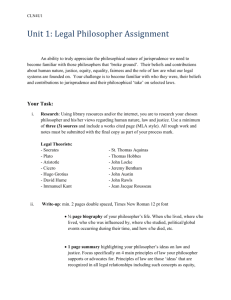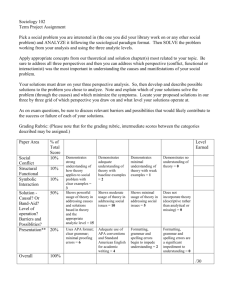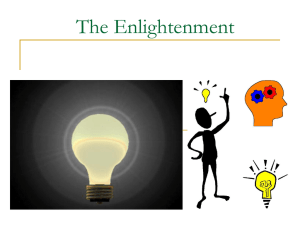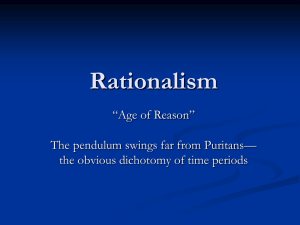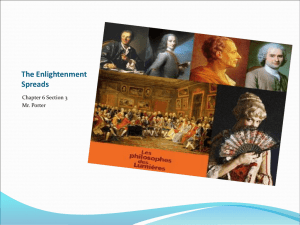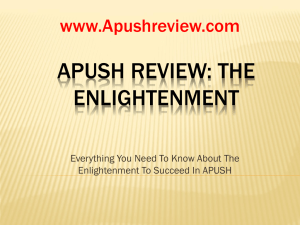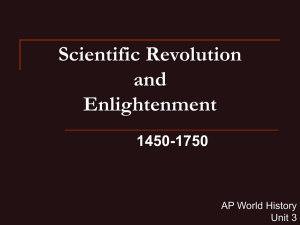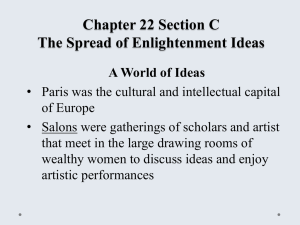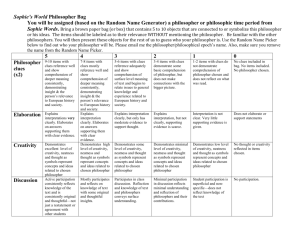Verona High School Department of History and Social Sciences
advertisement
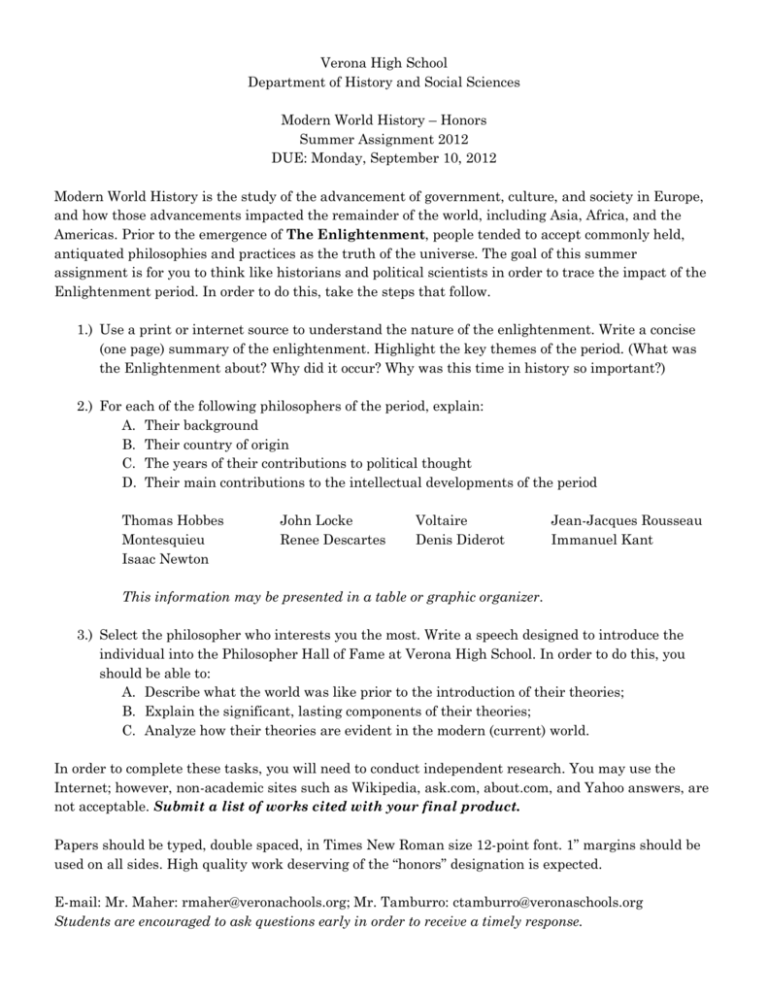
Verona High School Department of History and Social Sciences Modern World History – Honors Summer Assignment 2012 DUE: Monday, September 10, 2012 Modern World History is the study of the advancement of government, culture, and society in Europe, and how those advancements impacted the remainder of the world, including Asia, Africa, and the Americas. Prior to the emergence of The Enlightenment, people tended to accept commonly held, antiquated philosophies and practices as the truth of the universe. The goal of this summer assignment is for you to think like historians and political scientists in order to trace the impact of the Enlightenment period. In order to do this, take the steps that follow. 1.) Use a print or internet source to understand the nature of the enlightenment. Write a concise (one page) summary of the enlightenment. Highlight the key themes of the period. (What was the Enlightenment about? Why did it occur? Why was this time in history so important?) 2.) For each of the following philosophers of the period, explain: A. Their background B. Their country of origin C. The years of their contributions to political thought D. Their main contributions to the intellectual developments of the period Thomas Hobbes Montesquieu Isaac Newton John Locke Renee Descartes Voltaire Denis Diderot Jean-Jacques Rousseau Immanuel Kant This information may be presented in a table or graphic organizer. 3.) Select the philosopher who interests you the most. Write a speech designed to introduce the individual into the Philosopher Hall of Fame at Verona High School. In order to do this, you should be able to: A. Describe what the world was like prior to the introduction of their theories; B. Explain the significant, lasting components of their theories; C. Analyze how their theories are evident in the modern (current) world. In order to complete these tasks, you will need to conduct independent research. You may use the Internet; however, non-academic sites such as Wikipedia, ask.com, about.com, and Yahoo answers, are not acceptable. Submit a list of works cited with your final product. Papers should be typed, double spaced, in Times New Roman size 12-point font. 1” margins should be used on all sides. High quality work deserving of the “honors” designation is expected. E-mail: Mr. Maher: rmaher@veronachools.org; Mr. Tamburro: ctamburro@veronaschools.org Students are encouraged to ask questions early in order to receive a timely response. Grading Rubric Modern World History – Honors Summer Assignment Name: Period: Points Earned Assignment Requirements Spelling, Grammar, and Mechanics Works Cited Summary Analysis Summary Supporting Information Philosopher Analysis Philosopher Supporting Information Speech Analysis Speech Supporting Information TOTAL / 90 Excellent (9-10) Product meets or exceeds all requirements on the instruction page; contains all components All components of the product are well constructed; assignment demonstrates evidence of planning and proofreading; few, if any spelling or grammar errors are present Works cited page is present; multiple sources are referenced; references are to academic sites Summary highlights the most significant themes of the enlightenment; demonstrates thorough research; student demonstrates thoughtful analysis of the research Summary is supported by numerous accurate examples and specific references to history Philosopher analysis demonstrates student understanding of the impact of the individuals on the Enlightenment period Multiple specific examples are used for each philosopher; all examples are historically accurate and relevant Speech is creative; product demonstrates a thorough understanding of the role of the philosopher; student successfully and thoughtfully connects the philosopher to today Speech is supported by multiple historic and current examples Satisfactory (7-8) Unsatisfactory (0-6) Product fails to meet one or two of requirements Product fails to meet more than two requirements Some components of the product are disorganized; some spelling or grammar errors are present Very disorganized; multiple spelling or grammar errors Works cited page is present; few sources are referenced; sources include non-academic sites Summary highlights some of the key themes of the Enlightenment, but misses some; demonstrates some research; analysis lacks thoughtfulness Works cited page is not present, or is significantly flawed Summary is supported by examples; some examples are not historically accurate Philosopher analysis demonstrates that students are approaching an understanding of the impact of the individuals on the Enlightenment period Some specific examples are used for each philosopher; most are historically accurate and relevant Speech is somewhat creative; product demonstrates a basic understanding of the role of the philosopher; student approaches a connection to today Summary is supported by few accurate examples Speech is supported by some historic and current examples Speech is supported by limited historic and current examples Summary fails to address most major themes of the enlightenment; demonstrates little research or thought Philosopher analysis fails to demonstrate an approach toward understanding the impact of the individuals on the Enlightenment period Few specific examples are used for each philosopher; examples lack historical accuracy and relevance Speech lacks creativity; product demonstrates limited understanding; student does not make a connection to today Internal Attachment NJCCCS: 6.2.12.A.2.a-c; 6.2.12.D.2.d-e; 6.2.12.A.3.a,c,e; 6.2.12.C.3.c; 6.2.12.D.3.a Transfer Goal: Students will be able to independently use their learning to apply the themes of Enlightenment thought and writing to a modern context to establish the enduring value of the movement Enduring Understandings: Dissent is a tradition born of the Enlightenment Superstition is no longer a basis for human knowledge Transformative change results from social, political, and economic problems Essential Questions: What is responsible dissent? Why do people believe in things without tangible evidence? What causes countries and/or people to demand transformative change?
